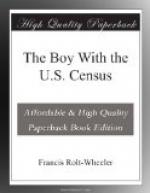“What I never could see,” remarked Hamilton, “was what started it all. It isn’t as if the people in the mountains had come from some part of the world where vendettas and that sort of thing had been going on for generations. There must have been some kind of reason for it in this section of the country. Feuds don’t spring up just for nothing.”
“Thar was a while once we had a powerful clever talker up hyeh,” the Kentuckian answered, “actin’ as schoolmaster for a few weeks. I reckon he’d offered to substitute jes’ to get a chance to see for himself what life in the mount’ns was like. He was writin’ a book about it. We got right frien’ly, an’ he knew he was always welcome hyeh, an’ one day I asked him jes’ that question. It was shortly befo’ he lef’ an’ I wanted to know what he thought about us all up hyeh.”
The mountaineer leaned back in his chair and chuckled with evident enjoyment of the recollection.
“I jes’ put the question to him,” he said, “in the mildes’ way, an’ he started right in to talk. Thar was no stoppin’ him, an’ I couldn’ remember one-half o’ what he said. But I reckon he had it about right.”
“How did he explain the feuds, Uncle Eli?” asked the boy.
“Wa’al,” said the mountaineer, with a short laugh, “he begun by sayin’ we were savages.”
“Savages?”
“Not jes’ with war-paint an’ tomahawk, yo’ understan’,” continued the old man, enjoying the boy’s astonishment, “but uncivilized an’ wild. Thar an’t any finer stock in the world, he said, than the mount’neers o’ the Ridge, clar down to Tennessee, an’ he said, too, that they were o’ the good old English breed, not foreigners like are comin’ in now.”
“That’s right enough,” Hamilton agreed, “and, what’s more, they were gentlemen of good birth, most of them; there was not much of the peasant in the early colonists.”
“So this author chap said. But he explained that was the very reason they got so wild.”
“I don’t see that,” objected Hamilton, “and I certainly don’t see where the ‘savage’ idea comes in.”
“Wa’al, he said that when you slid down from a high place it was harder to climb back than if the fall had b’n small. An’ that’s why it’s so hard for those who have gone down,—they can see the depth o’ the fall.”
Hamilton, who was of an argumentative turn of mind, would have protested at this, but the old mountaineer proceeded.
“When the pioneers settled in the mount’ns they kind o’ stuck. Those that went on, down into the Blue Grass region, went boomin’ right ahead, but those that stayed in the mount’ns had no chance.”
“I don’t see why not?” objected the boy.
“They were jes’ cut off from everywhar. We are to-day, for that matter. When a place gets settled, an’ starts to try an’ raise somethin’ to sell, the product has got to be taken to market. But thar was no railroad up in the mount’ns. Children were easy to raise, an’ a population grew up in a hurry, but the land was too poor for good farmin’, the roads were too bad for takin’ corn to market, an’ thar was no way o’ gettin’ to a town.”




